![[𝗢𝗟𝗗] LTL Chengdu Logo](https://old.ltl-chengdu.com/wp-content/sites/25/logo-ltl-header.png)
![[𝗢𝗟𝗗] LTL Chengdu Logo](https://old.ltl-chengdu.com/wp-content/sites/25/logo-ltl-header.png)
![[𝗢𝗟𝗗] LTL Chengdu Logo](https://old.ltl-chengdu.com/wp-content/sites/25/logo-ltl-header.png)


Email: [email protected]
Phone: +86 (0) 10 65129057
Mon-Fri: 9am-6.30pm China Time
Beijing CBD, Jianguo Rd. 88 Xiandai SOHO
Building B, 5th Floor, Room 504
建国路88号现代城SOHO B座 504

Hi, my name is Mojca! I am from Slovenia in Europe and I work as a student advisor at our Shanghai school. Please contact me if you wish to come and study with us!
Email: [email protected]
WeChat ID: Mojca_LTL

Nature
Chengdu is the capital of Sichuan province in Western China, which means it’s surrounded by breathtaking scenery.
In fact, Sichuan province is nicknamed “Country of Heaven” 天府之过 (Tiānfǔ zhi Guó) precisely because of its natural beauty and its fertile soil.

You don’t have to go far to find nature when you’re living in Chengdu.
A mere 30-minutes away by train stands the majestic Mount Qingcheng. Hiking the route up the far side of the mountain to the summit takes a few hours, with waterfalls and lush green woodlands en-route.
When you get to the top, you can even take a cable-car to get an aerial view of the surrounding mountains and valleys.
Sichuan province is also home to one of the most famous national parks in China, Jiuzhaigou Valley National Park.
DID YOU KNOW – When the high-speed railway line from Chengdu is completed in late 2019/early 2020, you’ll be able to reach its sapphire blue lakes in just two hours.
For more adventurous types, you may consider a long weekend trip to Western Sichuan – where nature runs more wild.
A recommended destination would be the mountain town of Kangding on the Tibetan plateau. Here the skies are big and bright blue, and snow graces the mountain tops all year round.

Value
If you want to get value for money, then studying in Chengdu is a great choice.
The cost of living in Chengdu is much lower than in cities like Shanghai, Beijing or Shenzhen.
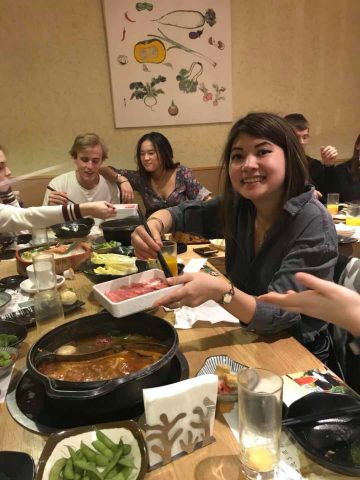
Whereas a simple lunch of street-side noodles will cost around 20 kuai ($3) in downtown Shanghai, you would generally never pay more than 12 kuai ($1.70) for a similar meal in Chengdu.
In fact, in many residential and student areas you can get a medium bowl of wontons or vegetarian noodles for half of that!
A popular student bar in Chengdu sells pints of draught lager for just 5 kuai ($0.70).
Many people who arrive in Chengdu after some time in Beijing or Shanghai also remark on the low price of taxis.
And, like everywhere in China, public transport costs are incredibly low compared to cities like New York, Paris or London. One journey on the subway will cost between 2 kuai ($0.30) and 5 kuai ($0.70). Bus journeys are capped at 2 kuai within the inner city network.

Pandas

We can’t talk about Chengdu without mentioning China’s most famous animal – the panda.
Chengdu is the place to be if you want to see a panda up-close. Or if you want to ride in a panda-themed subway car. Or eat in a panda-themed restaurant. Or buy a panda hat. (You get the idea)
Pandas are undeniably adorable. Granted, that’s mainly because they’re just so bad at doing normal bear things. Like looking scary. Or climbing trees. Or catching prey.
Did you know? Pandas are biologically carnivorous. Except in practice, they prefer to stick to just eating bamboo. For twelve to fourteen hours PER DAY.
If you want to see pandas in their natural climate, there’s nowhere better than Sichuan province – home to several spacious research centres, with plenty of room for the pandas to eat and play.
The Chengdu Research Base of Giant Panda Breeding is usually the most convenient for our students. It’s one of Chengdu’s most popular attractions – for just 58 kuai you can spend as long as you want ogling at the 100 odd pandas that live there.
But half an hour outside of the city you can also see the pandas in a more remote mountain setting, at the panda research base in Dujiangyan. We recommend this if you have the time, as there tend to be fewer crowds!
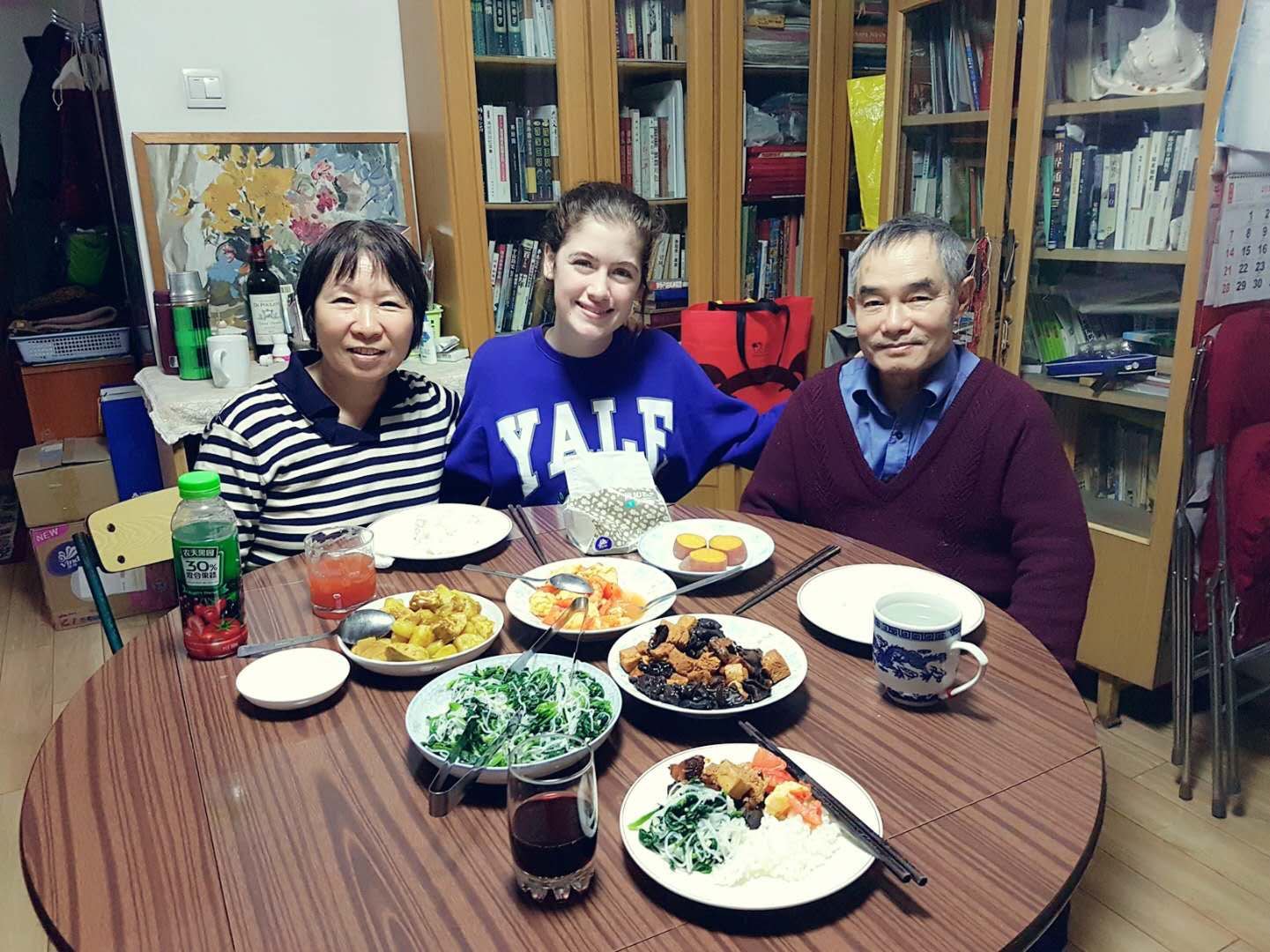
Together
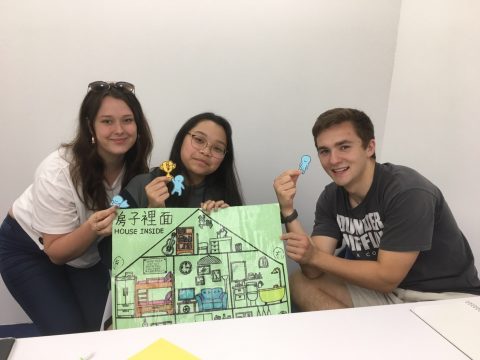
From students to staff, staff to teachers, teachers to students, everyone at LTL is tight-knit and here to help.
We are lucky at LTL throughout all our schools to have a community which stays together, helping one another improve their Chinese, discover China and experience this amazing country.
No matter how LTL grows there is one core value that we always strive to retain and that is quality. As numbers grow, quality will always remain the same and the personal touch that runs through the veins of LTL Mandarin School.

Professional
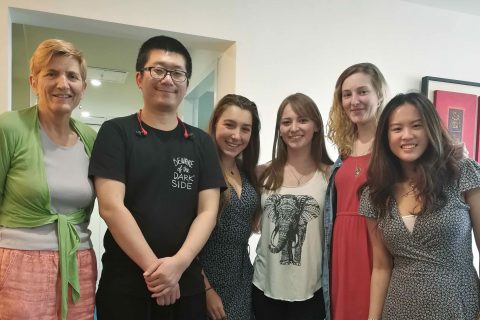
The value of a good teacher cannot be underestimated. Our professional teaching faculty is the bedrock of everything we do here at LTL – and we are proud to show them off.
Every single one of our teachers has chosen to pursue teaching Mandarin as a profession. That means they’ve graduated with a qualification in Teaching Chinese as a Foreign Language, and have now dedicated themselves full-time to teaching at LTL.
We have a very stringent recruitment and training process in place for all new teachers. And across all the LTL schools, we have a very high staff retention rate too – a number of our teachers have worked with us for almost ten years!

Supportive

We understand how hard it is to put your life back home on pause, and move halfway across the world for study.
Especially when you don’t feel confident (yet!) in speaking Chinese.
We know and understand because we’ve done it ourselves – LTL Mandarin School is staffed not only with native Chinese teachers, but also with an international team of English-speaking Student Advisors.
As long-term expats in China, they’ll be here to guide you through the process of settling in.
Here are some examples of where the Student Advisor team can help you:
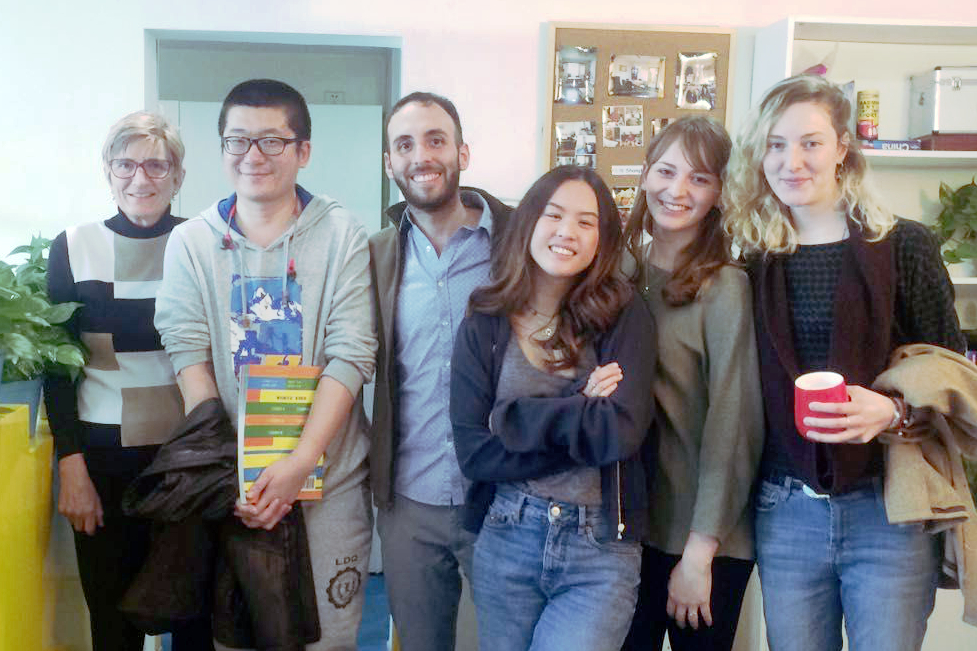
Bespoke
We are not a one-size-fits-all school. Over the years, the network of LTL Schools has hosted over 3500 students of all different backgrounds, ages and learning styles. We attract such a diverse range of students because we design the study program around the student.

Beginner, Intermediate or Advanced?
If you’re not sure how to describe your current level of Chinese – don’t worry.
Students with any level of prior Chinese experience are invited to a video-call with our Director of Studies, who has years of experience in assessing language ability. During the short interview you will discuss your reasons for learning Mandarin Chinese, your preferred learning style, and have a short conversation in Chinese to check your level.
We can be sure that your teaching materials are suitable for your level and learning style.

Some want to learn Chinese in small groups – this has a number of benefits, not least that it’s a more affordable option for many.
Learning in groups of four to six fosters a real sense of camaraderie between the students, and often, an atmosphere of lively discussion and debate.
Others would prefer to study with a professional teacher one-on-one, so they can really focus on certain aspects of their Chinese – perhaps accurate pronunciation, vocabulary for an upcoming HSK exam, or studying for an important work-related project.
And many of our students choose to do a combination of both!
Whilst the vast majority of our students choose to live with one of our trusted Chengdu homestay families during their study program, we understand that some students may prefer to stay in private accommodation.
We have a number of contacts for modern single-occupancy apartments in Chengdu, as well as local and international hotels.
Just let us know, and we’d be happy to help you organise this!

Air Quality
China has gained somewhat of a bad reputation for its air quality record, and this can put off international visitors.
Although recent government measures have massively improved air quality ratings in Beijing and Shanghai, these two cities still attract the majority of international attention for environmental matters.
Chengdu, on the other hand, is internationally-recognised as one of the best places to live in Asia with regard to air and water quality.
The Asian Development Bank named it as the most “liveable” city in Mainland China, thanks to its consistently excellent air quality record and the fresh water supplies from the surrounding mountains.
It certainly helps that Chengdu is incredibly green. In fact, the whole city sometimes feels like one big park, with trees lining most streets. These not only guarantees fresher air, but also creates some welcome shade in the hot summer months.
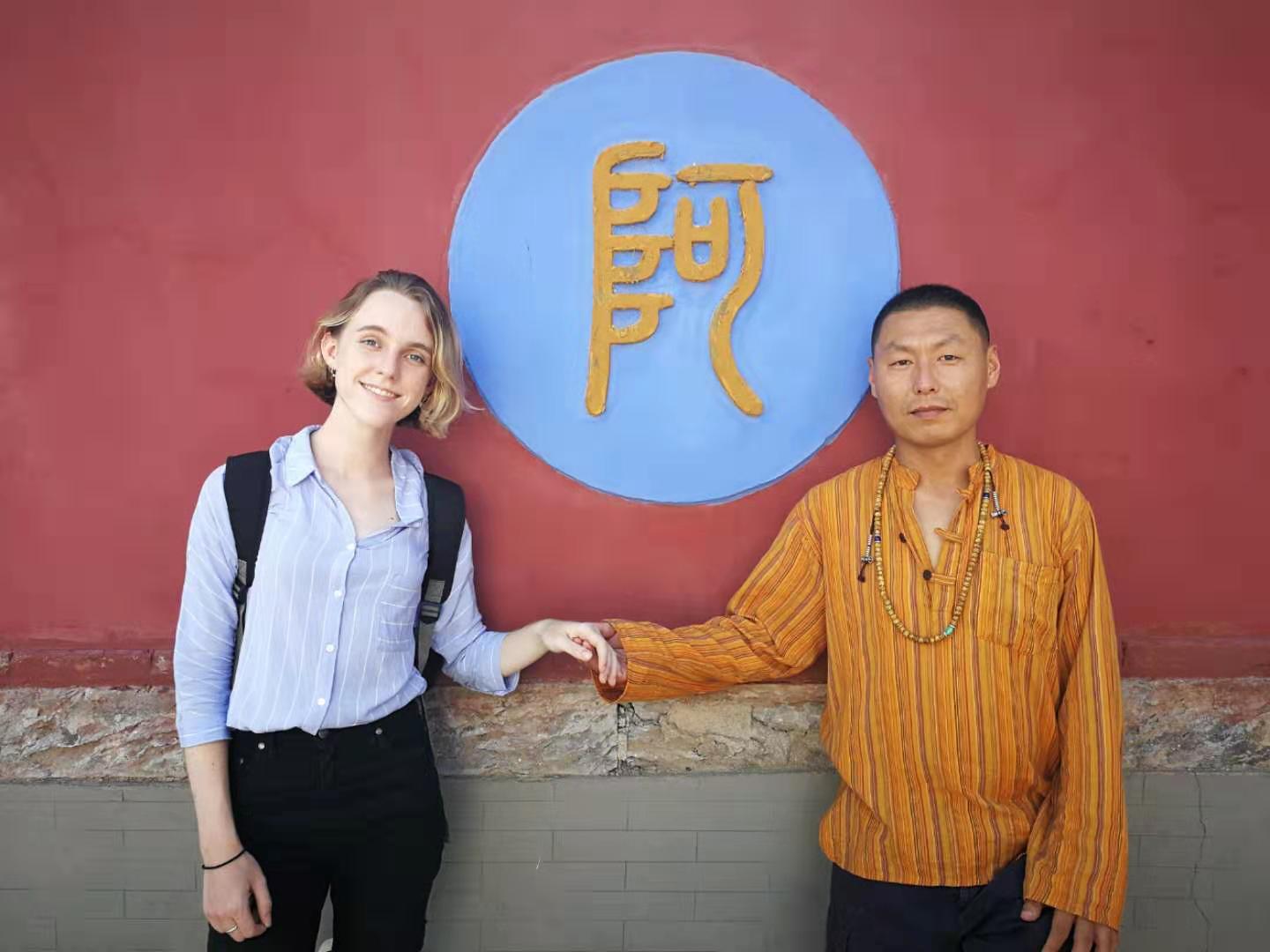
Accredited
Don’t just take our word for it!
A number of government Education Ministries, independent agencies, newspaper journalists and TV companies have recognised LTL Mandarin School as a top-quality provider of Chinese language programs.
We’ve been on national Chinese television – more than once. We’ve been visited and interviewed by journalists from leading newspapers (The Telegraph in the UK, Die Welt in Germany).
We’ve received glowing reviews from our former students in the form of testimonials, TripAdvisor comments and Google reviews.
And to top it off, we’ve been accredited by a host of educational organisations:

LTL Mandarin School is a fully-accredited member of the International Association of Language Centres (IALC), the world’s first and oldest association of private language schools.
This means we operate the school based on the IALC Code of Ethics and are subject to regular inspections.
The Chinese Government has recognised LTL Mandarin School as an ‘Accredited Provider of Cultural Programs’ and also an official exam centre for the HSK Chinese Proficiency exams.
Yes, that means you can gain your HSK certification while you’re here!

The German Ministry of Education has certified LTL Mandarin School as a provider of ‘Educational Holiday Trips’ (Bildungsurlaub).
This means that German citizens can apply to take sabbatical leave from work in order to study Chinese at an LTL School.

The Swedish National Agency for Higher Education (Högskoleverket/CSN) has recognised LTL Mandarin School as a certified “Education Provider”.
This means that Swedish citizens may be eligible for scholarships and/or time off work in order to complete their chosen LTL program.
LTL class credits are recognised by universities around the world, including Michigan State University. Want to find out how to claim credits? Just get in touch with our Student Advisor team.
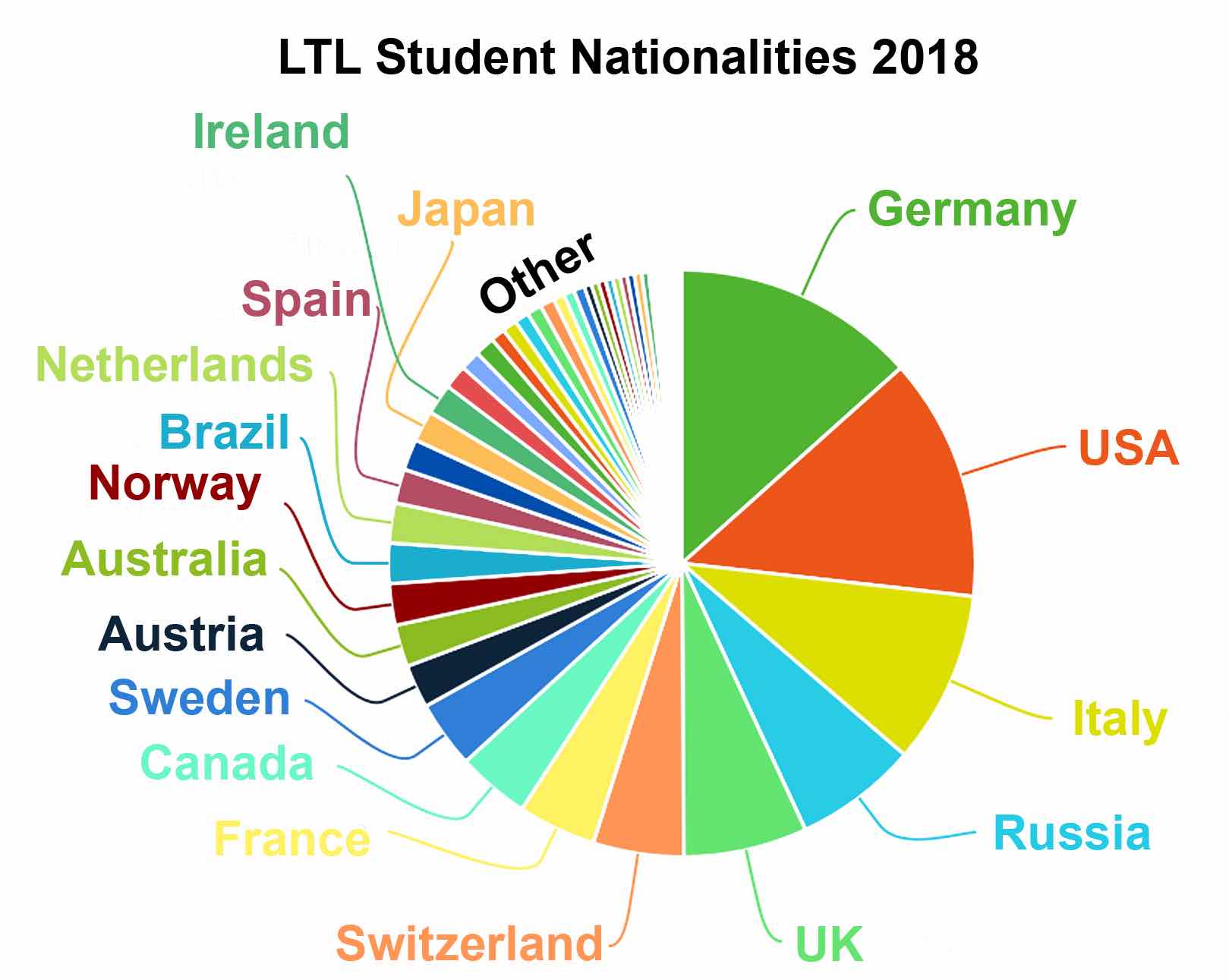
International
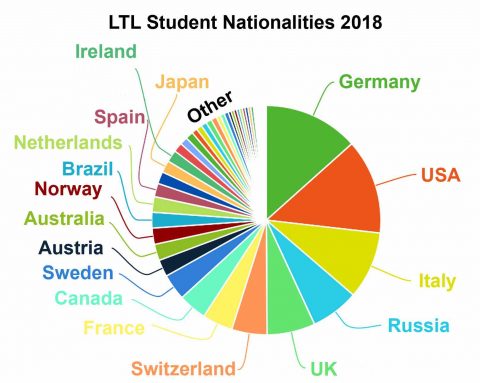
We have been helping students to learn Chinese since 2008.
In that time, we’ve been lucky enough to host students at our various schools from at least 105 different countries – from Brazil to Bhutan, from Austria to Australia.
What’s more, there’s a real sense of shared purpose and community.
Students and teachers often eat lunch together after class, and we organise regular weekend trips so new arrivals can get to know each other outside of the classroom.
Many of our students stay in touch with us and each other via social media after they’ve returned home. Several of them have even come back for a second program the following year!

Tradition
You may have heard that the pace of life in Chengdu is slower than in the megacities of Shanghai and Beijing.

And you’d be right – a certain sense of peace pervades the streets of Chengdu.
Locals seem to have plenty of time to stop in the street and chat with neighbours, practice Tai Chi outside their apartment, or play a game of Mahjong next to the river.
Every day of the week you can find families and friends sitting together in the beautiful old teahouses, and perhaps even getting their ears cleaned by an Old Master while they’re there (a habit unique to Chengdu!)
For those of you who are interested in seeing traditional Chinese culture in action, there is no better city.
These activities are not staged performances – they are simply people going about their daily lives, and enjoying the same pastimes that their ancestors invented centuries ago.
Chengdu is also home to a wealth of beautiful Buddhist and Taoist temple complexes – we recommend a visit to the Wenshu Monastery, which has a staggering 1,400 years of history.
The Sichuanese are also proud of their unique local art forms, and rightly so. You may have heard of Peking Opera, but how about Sichuan Opera?
Performers of this style have a few distinctive tricks up their sleeves – including rapid “face changing” and fire breathing! You can watch a show almost any night of the week in various locations across downtown Chengdu.

Immersive
In order to learn Chinese quickly and effectively, you cannot rely on classroom time alone. Whatever your level, it’s important that you spend plenty of time trying out what you’ve learnt in the real world too.

Yes, you’ve absolutely got to Live The Language (LTL) while you’re here in China. We’re so dedicated to this philosophy of learning Chinese that we named our school after it!
Immersion can be achieved in many ways.
Many of our students opt to live with one of LTL’s local homestay families, so that they’re hearing and speaking Mandarin Chinese from dawn till dusk.
In fact, around 80% of LTL students choose this accommodation option. All homestay packages in Chengdu come with a private bedroom, free Wi-Fi and air-con, and delicious home-cooked meals – but most importantly, it comes with a family who will make you feel right at home! Each and every homestay family we work with has been vetted by our expert team, who have been running homestay programs in China for over a decade.
There are also a whole host of ways to get to know native speakers in Chengdu. As the capital of Sichuan province, Chengdu is the hub for regional sports teams, hiking and running clubs, book launches, volunteer opportunities and language mixers.
We’re more than happy to help you find and get in contact with these groups, so you can make the most of your time after class. Spending time doing something you love while communicating in Chinese is a brilliant motivator for your language learning. You may even make friends for life!

Food
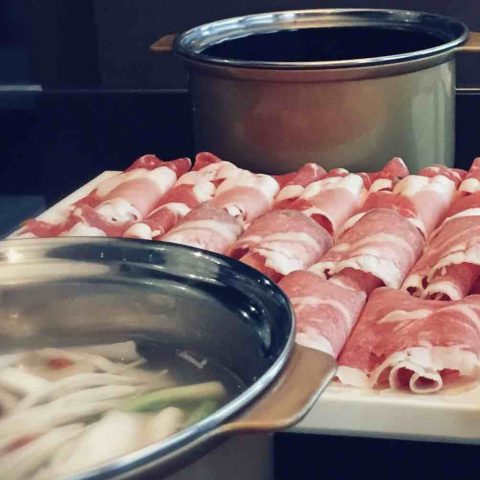
Food, glorious food! And the food in Chengdu certainly is glorious. In fact, UNESCO recently named Chengdu as an official City of Gastronomy!
The city’s food culture mainly centres around traditional Sichuanese dishes – this is the capital of Sichuan province, after all.
However, since Chengdu is a modern metropolis with a growing number of international visitors and middle-class residents, there are also plenty of restaurants catering to other tastes.
You won’t need to go far to find fresh Japanese sushi, all-American burgers and beer, or a fragrant Indian curry.

If you’re after the authentic local experience, then you need to explore the backstreets. Street food culture still thrives here, whereas it has been all but lost in more developed cities like Beijing or Shanghai.
A trip to your local food market will certainly be a feast for all the senses!
And of course, no trip to Chengdu would be complete without a trip to a hot pot restaurant.
WARNING – We’re in Sichuan, so hot pot here is the REAL DEAL.
Tongue-numbing Sichuan peppercorns combine with red-hot fiery chillies to create a literally mind-blowing culinary experience. Go on, we dare you.
(Disclaimer: mild hot pot broths are available at most restaurants!)

Flexible

Whichever month you want to start studying with us, we’ve got you covered.
If you’re a complete beginner, then we offer monthly starting dates for our Small Group courses in Chengdu.
If you’ve already studied some Mandarin before? We can be even more flexible!
In that case, you can start your Small Group language program on any Monday of the year. The same flexibility applies to those who want to take a more personalised, 1-on-1 course in our Chengdu school.
We also don’t hold you to any application deadlines – as long as we have available classroom space on your preferred starting date, we will book you in.
Just be aware that most incoming students will require a study visa before arriving in China, and the processing time for these visas is beyond our control. We therefore recommend that you sign up and get the visa documentation at least one month before you want to start!